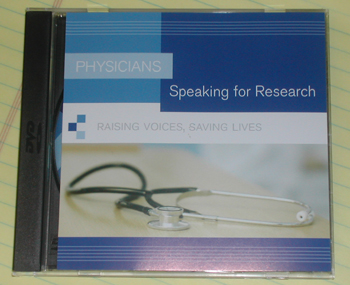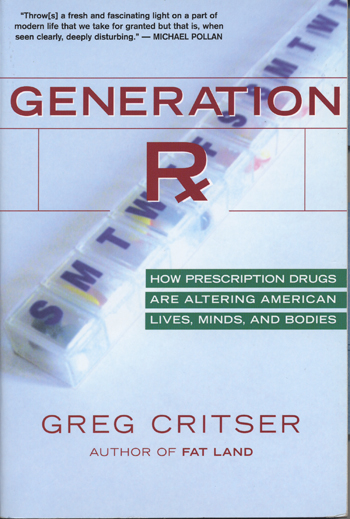People with concerns about the use of animals in biomedical research should also be concerned about the actions of the Animal Liberation Front and other “animal rights” groups — at least if they want other people to take their concerns seriously.
It seems that ALF views actions like the attack of the home of UCLA scientist Edythe London last week as somehow advancing its cause. This in itself makes it pretty clear to me that they have set aside reasoned discourse as a tool and gone straight to violence and intimidation.
Category Archives: Medicine
DVD review: Physicians – Speaking for Research.
 The other day I received a DVD made by Americans for Medical Progress called Physicians – Speaking for Research. (They indicate on their site that the DVDs are free for the asking.)
The other day I received a DVD made by Americans for Medical Progress called Physicians – Speaking for Research. (They indicate on their site that the DVDs are free for the asking.)
This is a DVD aimed at physicians, rather than at research scientists or the general public. However, the aim of the DVD is to help physicians to be better at communicating with the general public (primarily their patients, but also their family members and neighbors) about the role animal research has played in medical advances upon which we depend today, and the continued importance animal research will continue to play in medical progress.
In other words, this is a resource prepared with the awareness that groups like PETA have spent a lot of time communicating their message directly to the public, while scientists and physicians haven’t made much of an organized effort to communicate their views on animal research to the public, nor even to think hard about precisely what that message might be or how to communicate it most clearly to laypeople. The DVD puts communication (dare I say it, framing) front and center.
How big a risk is my laser printer?
On the basis of this article about emissions from laser printers, our department administrator came by this week to take my HP 1200 series LaserJet away.
I said I wanted to keep it.
A resolution for the Tripoli six.
Almost a year ago, I learned about the case of the Tripoli six, five Bulgarian nurses and a Palestinian physician in Libya sentenced to death for infecting hundreds of children with HIV despite the fact that the best scientific evidence indicated that the children were infected due to negligence in the hospital well before these health care workers even arrived in Libya.
Some questions about the cadaver calculator.
Orac’s calculated value (if he shuffled off this mortal coil in his present state — and I really hope he doesn’t) piqued my curiosity and led me to calculate the value of my own potential cadaver. But the calculated value leaves me curious about the assumptions underpinning the calculation.
First, my results:
Is medicine an art or a science?
In his book Generation Rx: How Prescription Drugs Are Altering American Lives, Minds, and Bodies (reviewed in the last post), Greg Critser includes a quotation from a physician (in a self-help book [1]) that I found really striking:
In your search … you are going to come across physicians who may initially be skeptical of any medication, technique, or new technology that has not already been proven to be successful with an indisputable double-blind study. This would not be the right physician for you. The very essence of Vitality Medicine has to do with flexibility, change, and a willingness to “experiment”.
Book review: Generation Rx.
 I recently finished reading Greg Critser’s Generation Rx: How Prescription Drugs Are Altering American Lives, Minds, and Bodies.
I recently finished reading Greg Critser’s Generation Rx: How Prescription Drugs Are Altering American Lives, Minds, and Bodies.
Frankly, I don’t feel so well.
Scientific plausibility of Never Let Me Go.
Since it has come up in the comments on my review of Kazuo Ishiguro’s novel Never Let Me Go, I’m going to go ahead and discuss some of the issues around cutting-edge biomedical technologies in the book that might, or might not, be plausible when pondered. (As Bill points out, the scientific details in the novel itself are pretty minimal — the focus is squarely on the interactions between characters — so plausibility is only an issue if you’re not good at suspending disbelief.)
WARNING: This post will be packed with spoilers!
Unless you’ve already read the book, or you have sworn a blood-oath never to read the book, you really should skip this post.
Book review: Never Let Me Go.

Last May, on my way back from a mini-conference in Stockholm, I had a long layover in Munich. Since major airports are now essentially shopping malls with parking for commercial jets, I used a little bit of that time to wander through a pretty impressive airport book store, where I picked up a copy of Never Let Me Go by Kazuo Ishiguro. I had heard a bit about it (maybe in reviews on the radio, if memory serves), and knew that it had some connection to ethical issues around biomedical technologies that seem not to be too far off from where we are now.
Because I was taking a stab at using my layover time wisely, though, I spent the hours at the airport reading a couple of other books I had promised to review for journals. Then, once on the plane, I slept. Then, I was back home fighting the twin demons of end-of-semester grading and jet lag.
A couple days ago, while straightening up some piles of books, I found Never Let Me Go and decided I needed some “me-time” reading a novel. Less than 48 hours later, I was finishing it and wondering what would count as a decent interval to wait before rereading it.
It’s a very good book. I’ll try to explain why without giving away too much, since a lot of the pleasure of reading this book is the way in which the reader comes into possession of key details as the story unfolds.
DVD review: Ethics in Biomedical Research
 On this blog I occasionally note a major motion picture that is (tangentially) related to ethics in science, not to mention seeking your advice on my movie-viewing decisions (the votes are running 2 to 1 in favor of my watching Flash Gordon; if I do, I may have to live-blog it).
On this blog I occasionally note a major motion picture that is (tangentially) related to ethics in science, not to mention seeking your advice on my movie-viewing decisions (the votes are running 2 to 1 in favor of my watching Flash Gordon; if I do, I may have to live-blog it).
Today, I’m going to give you an actual review* of a DVD whose subject is ethical scientific research.
Because you ought to have options when planning your weekend!
